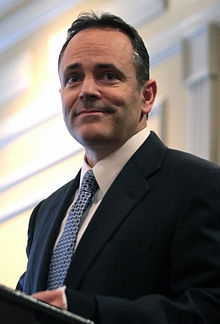You have /5 articles left.
Sign up for a free account or log in.

Governor Matt Bevin
Wikipedia
A state judge on Friday issued a temporary injunction blocking -- at least for now -- Kentucky Governor Matt Bevin’s appointment of a new Board of Trustees at the University of Louisville.
The decision throws into doubt the standing of the board and its ability to make decisions on the university’s behalf until the situation is resolved in court.
Bevin, a Republican, announced in June that longtime President James Ramsey would step down and the governor would take the unprecedented step of dismissing nearly the entire 20-member Board of Trustees and replacing it with a smaller 13-person governing body. Faculty members asked trustees to seek an injunction blocking the decision, and the state’s attorney general, Andy Beshear, filed the challenge in Franklin Circuit Court.
The governor called the Democratic attorney general's intervention in the case "purely political." But many faculty members and outside observers -- even many eager to turn the page on Ramsey's leadership -- said that they worry the governor's move undercut the independence of the university.
The new roadblock for Bevin’s leadership reorganization at Louisville raises questions about the departure of Ramsey, who agreed to resign, during extended negotiations, if a new board was put in place. The new board installed by Bevin last week voted to accept the Louisville president’s resignation. Ramsey was under public pressure because of a series of scandals throughout his 14-year tenure at the university. But he planned to continue in his role as president of the University of Louisville Foundation.
Cindy Hess, a spokeswoman for the university, said because Louisville wasn't party to the lawsuit, it wouldn't be commenting on the decision or have any comments on possible impacts on Ramsey's departure. Louisville Provost Neville Pinto is leading the university on an interim basis while the search for a new president proceeds.
Judge Phillip Shepherd’s decision -- issued in a 22-page order -- finds that the court was required to intervene to preserve the separation of powers under the Kentucky Constitution.
“If an embattled university president can bypass the Board of Trustees and negotiate the removal of the entire board with the governor (with no due process), then the authority and independence of that Board of Trustees would seem to be greatly undermined,” Shepherd wrote in the decision, which blocks Bevin's executive action pending a final ruling.
David Owen, chair of the Louisville philosophy department and one of the faculty members who urged trustees to seek an injunction, said he was pleased the judge shared concerns that Bevin's actions undermined the independence of university governance from external political influence. Those actions directly threaten academic freedom and have put the university's accreditation under review by the Southern Association of Colleges and Schools, he said.
Beshear called the ruling a win for Kentucky students, families and public universities.
“The governor does not have ‘absolute authority’ to ignore the Constitution and Kentucky law,” he said in a statement. “I will continue my job of enforcing our Constitution’s separation of powers so that no one branch of government, regardless of who leads it, has absolute power.”
But Bevin spokeswoman Amanda Stamper said the governor’s office was confident that the temporary injunction would be reversed on appeal and that the judge's order had ignored binding precedent.
“The circuit court ignored binding precedent from the Kentucky Court of Appeals, the plain language of the statute at issue and a recent opinion from the Office of the Attorney General, that the governor has authority to propose and temporarily implement the reorganization of the University of Louisville Board of Trustees,” she said in a statement. “The court’s abrupt altering of the status quo, just as the newly constituted university board has begun to take constructive steps to put the university on a solid path forward, is neither in the best interest of the university nor the public.”
New Report on Perks at University
Meanwhile, a new report surfaced on the kind of big spending on administrators that many found troublesome during Ramsey's presidency.
The Kentucky Center for Investigative Reporting examined the contracts of top administrators at the university and found the following:
- Two administrators have contracts that award them full-time salary through 2020 if their employment is ended by the university in the two years after Ramsey's departure.
- Five administrators have $1,000-a-month car allowances.
- The athletic director gets two cars.
- Seven administrators may bring spouses (and in some cases children) with them, at the university's expense, when the administrators travel on university business.




